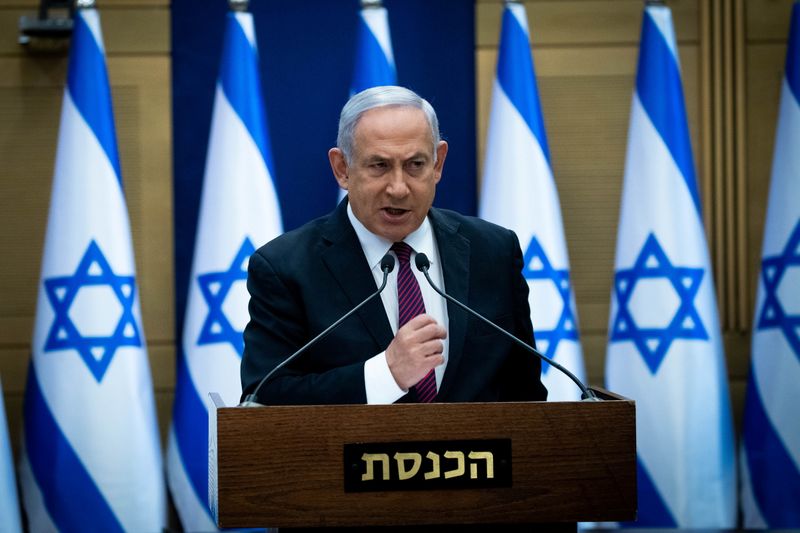By Jeffrey Heller
JERUSALEM (Reuters) - Israel edged closer on Wednesday towards a fourth national election in two years after Prime Minister Benjamin Netanyahu's main governing partner, Benny Gantz, backed an opposition move to dissolve parliament.
Parliament gave preliminary approval to a dissolution bill, but the legislation needs to pass three as yet unscheduled votes to become law, giving Netanyahu and Gantz, the defence minister, more time to work out differences over a national budget.
The coalition crisis could plunge Israel into more political uncertainty as it prepares for a new U.S. administration led by Joe Biden, deals with the coronavirus pandemic and awaits Iran's next moves after the assassination of its top nuclear scientist last week, a killing that Tehran blamed on Israel.
With final passage of the dissolution bill still uncertain, the budget dispute could in itself trigger a new election. Under law, failure to pass a budget by a Dec. 23 deadline means Israel would go to the polls in March.
"Benny Gantz has to pull the emergency brake," Netanyahu, who voted against the bill, said in special televised address after the parliamentary session.
But Israeli political commentators voiced scepticism that Netanyahu was seeking to save the so-called "unity" government, citing a looming "rotation" arrangement in which Gantz, head of the centrist Blue and White party, is due to take over from Israel's longest-serving leader in November 2021.
Even as that pact was being inked in May, few analysts in Israel believed that Netanyahu, on trial for alleged corruption which he denies, would relinquish his powerful post.
Asked if the handover was still in the cards, Netanyahu, taking questions after his speech, alleged that Gantz had pursued partisan policies violating the spirit of their unity agreement.
Gantz, who has said an election could be averted if Netanyahu carried out the coalition accord's call for a budget covering 2020 and 2021, accused him of "trickery".
If a 2021 budget needs to be passed separately, Netanyahu would gain another tool to block "rotation" because failure to approve that fiscal package by March would also trigger an election.
Political commentators on Israel's three main TV channels described Netanyahu's address, in which he hailed what he said were a series of health and diplomatic achievements under his leadership, as an election speech kicking off a campaign.
TIMING
Strategic timing for an early ballot could be crucial as Netanyahu weighs another fight for political survival after failing to win outright elections in April and September 2019 and in March this year in which Gantz was his main rival.
Netanyahu, who has led Israel since 2009 after serving a first term as premier from 1996 to 1999, has been facing a wave of street protests against his alleged corruption, which he denies, and his handling of the COVID-19 pandemic.
But recent opinion polls have predicted a strong showing for right-wing and religious parties that could rally around Netanyahu or another conservative challenger, former Defence Minister Naftali Bennett.
Gantz faces his own political risks: he has seen his popularity drop after alienating supporters by reneging on election promises not to join up with Netanyahu.
"Netanyahu prefers a May-June (election date) with a coronavirus vaccine and breathing space for businesses," YNet News political reporter Moran Azulay wrote. "Gantz wants quick elections to stop Netanyahu organising."

